Bio 141 - Study guides, Class notes & Summaries
Looking for the best study guides, study notes and summaries about Bio 141? On this page you'll find 399 study documents about Bio 141.
Page 3 out of 399 results
Sort by
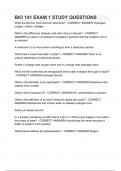
-
BIO 141 EXAM 1 STUDY QUESTIONS with complete solution
- Exam (elaborations) • 13 pages • 2024
- Available in package deal
-
- $7.99
- + learn more
BIO 141 EXAM 1 STUDY QUESTIONS with complete solution
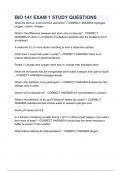
-
BIO 141 EXAM 1 STUDY QUESTIONS with complete solution
- Exam (elaborations) • 13 pages • 2024
- Available in package deal
-
- $7.99
- + learn more
BIO 141 EXAM 1 STUDY QUESTIONS with complete solution
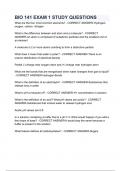
-
BIO 141 EXAM 1 STUDY QUESTIONS with complete solution
- Exam (elaborations) • 13 pages • 2024
- Available in package deal
-
- $7.99
- + learn more
BIO 141 EXAM 1 STUDY QUESTIONS with complete solution
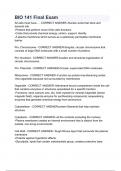
-
BIO 141 Final Exam (2)
- Exam (elaborations) • 34 pages • 2024
- Available in package deal
-
- $7.99
- + learn more
BIO 141 Final Exam (2)
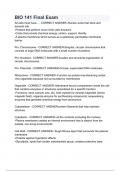
-
BIO 141 Final Exam
- Exam (elaborations) • 34 pages • 2024
- Available in package deal
-
- $7.99
- + learn more
BIO 141 Final Exam
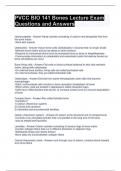
-
PVCC BIO 141 Bones Lecture Exam Questions and Answers
- Exam (elaborations) • 11 pages • 2024
-
- $13.29
- + learn more
PVCC BIO 141 Bones Lecture Exam Questions and Answers Hydroxyapatite - Answer-Hardy crystals consisting of calcium and phosphate that form the bone matrix. -Work with osteoid Osteocytes - Answer-mature bone cells (osteoblasts) in lacunae that no longer divide -Maintain bone matrix and act as stress or strain sensory -Respond to mechanical stimuli such as increased force on bone or weightlessness -Communicate information to osteoblasts and osteoclasts (cells that destroy bones) so bon...
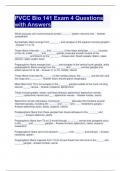
-
PVCC Bio 141 Exam 4 Questions with Answers
- Exam (elaborations) • 9 pages • 2024
-
- $13.39
- + learn more
PVCC Bio 141 Exam 4 Questions with Answers White and gray rami communicants contain ______- system neurons only. - Answer-sympathetic Sympathetic fibers emerge from _______- and synapse in the superior cervical ganglion - Answer-T1 to T4 These fibers innervate _____ and _________ of the head; stimulate _______ muscles of the iris; inhibit ______ and _______ glands; innervate smooth muscle of the ___________ and branch to the _______ - Answer-skin, blood vessels, dilator, nasal, salivary,...
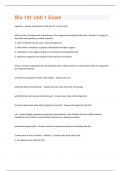
-
Bio 141 Unit 1 Exam Questions And Answers Solved 100% Correct!!
- Exam (elaborations) • 18 pages • 2024
- Available in package deal
-
- $7.99
- + learn more
organism - Answer-living entity made up of 1 or more cells what are the 5 fundamental characteristics of an organism; briefly describe each - Answer-1. energy: to stay alive and reproduce; usually acquired 2. cells: membrane bound units, make up organisms 3. information: hereditary or genetic information encoded in genes 4. replication: every organisms goal is to reproduce and replicate itself 5. evolution: organisms are products and continue to evolution theory - Answer-explanation for e...
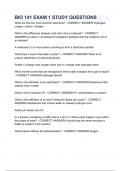
-
BIO 141 EXAM 1 STUDY QUESTIONS with complete solution / Latest updated .
- Exam (elaborations) • 13 pages • 2024
- Available in package deal
-
- $7.99
- + learn more
BIO 141 EXAM 1 STUDY QUESTIONS with complete solution / Latest updated .
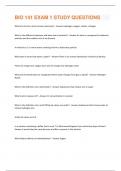
-
BIO 141 EXAM 1 STUDY QUESTIONS SOLVED CORRECTLY & GRADED A+
- Exam (elaborations) • 14 pages • 2024
- Available in package deal
-
- $7.99
- + learn more
What are the four most common elements? - Answer-Hydrogen, oxygen, carbon, nitrogen What is the difference between and atom and a molecule? - Answer-An atom is composed of subatomic particles and the smallest unit of an element A molecule is 2 or more atoms combing to form a distinctive particle What does it mean that water is polar? - Answer-There is an uneven distribution of electrical density Partial (-) charge near oxygen atom and (+) charge near hydrogen atom What are the bonds that a...

Study stress? For sellers on Stuvia, these are actually golden times. KA-CHING! Earn from your study resources too and start uploading now. Discover all about earning on Stuvia


